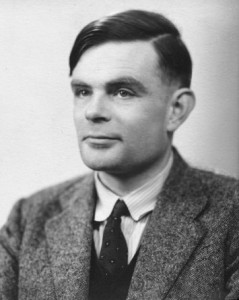 It was learning about Alan Turing’s life and death that inspired me to create this section in recognition of those people who have contributed positively to our advancement as a species without their due of public accolades or historical renown.
It was learning about Alan Turing’s life and death that inspired me to create this section in recognition of those people who have contributed positively to our advancement as a species without their due of public accolades or historical renown.
Alan Turing showed early promise as a mathematician, and biographies of him abound with anecdotes testifying to his brilliance: solving advanced problems without ever having formally studied calculus, for example, or grappling meaningfully with Einstein’s work before leaving puberty. He continued his formal studies in mathematics, making serious contributions to computational theory that posterity has recognized as being foundational to the emergence of algorithm-based computing, and for which Turing is known as the ‘father of computer science and artificial intelligence.’ But his greatest contributions to history came with the outbreak of the Second World War. Turing was enlisted at Bletchley Park, code-named Station X, a secret Allied code-breaking project focused predominantly on deciphering the German Enigma machine that was used to encrypt their military correspondence.
Amongst this group of mathematicians, statisticians and cryptologists, Turing stood out, both for his genius and for his eccentricity (he often ran the 40 miles from Bletchley Park to London for formal reports on the progress of the code breaking). Within weeks of his arrival he had revolutionized the approach towards cracking the German cypher and he deserves no small share of the praise for their eventual success. Troop movements, U-Boat orders, battlefield plans – the cracking of the code delivered into Allied hands the key to victory and doubtless saved thousands upon thousands of lives from further brutality.
Why, then, have you likely never heard his name? Why is his narrative so rarely included in the larger celebrations of that storied moment in history? In 1952, less than a decade after his finest hour, he was brought before a criminal court and charged with ‘gross indecency’ for his confessed participation in ‘homosexual acts.’ On top of being a brilliant mathematician and the savior of his country, Turing was gay, and gay in a time when homosexuality was a criminal offense. He was given the choice of imprisonment or a chemical injection of estrogen, designed to curb his libido but amounting, in truth, to chemical castration. He was rendered impotent, and henceforth plagued by gynecomastia, the enlargement or growth of male breasts. Aspersions were cast upon his loyalties, resulting in the revocation of his security access and his eventual dismissal from government cryptography work. Two years after his trial, he committed suicide by ingesting an apple poisoned with cyanide.
Thus the life begun in glory ended in ignominy, a permanent blot upon the history of the nation of Britain, who could find no better reward for Turing’s brilliance and devotion than ridicule and betrayal. Worse still, the disgrace continues: it was only in 2009 that the British government issued an official apology for his treatment, and attempts to grant him a posthumous statutory pardon have thus far been unsuccessful.
I can give my anger no better expression than this poem written by A.E. Housman in reaction to the trial of Oscar Wilde, whose life shares many parallels with Turing’s. But choosing rather to end on a note of optimism, I can happily report that if the British government has been slow to correct its wrongs, its universities have paid Turing ample tribute, and a screenplay based upon his life has garnered enough attention to attract such actors as Leonardo DiCaprio and Benedict Cumberbatch (whom I favor) to the role, renewing the hope that Turing’s rightful reputation in history be restored. I close with the words of Steven Pinker, who began his chapter on “Gay Rights” in his latest book by invoking Turing’s memory:
It would be an exaggeration to say that the British mathematician Alan Turing explained the nature of logical and mathematical reasoning, invented the digital computer, solved the mind-body problem, and saved Western civilization. But it would not be much of an exaggeration.